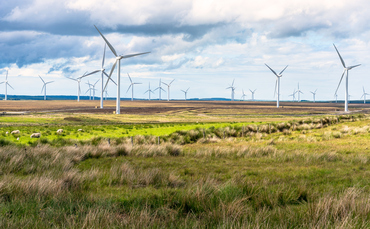

Latest evidence of support for onshore renewables development comes as government faces further splits over controversial coal mine planning decision
Nearly two thirds of Conservative voters support the development of new onshore wind turbines, even near to their homes, according to the latest poll to reveal overwhelming public backing for onshore renewables projects.
The YouGov poll on behalf of the Times found that 67 per cent of voters think the de facto ban on new onshore wind farms in England should be lifted. Among Conservative voters the share backing proposals to remove the ban falls only fractionally to 66 per cent with just 22 per cent wanting the current policy to remain in place.
When asked if they would support the construction of a wind farm near their home, 64 per cent of Tory voters said they would and 30 per cent said they would oppose it.
The results come as the government weighs how to respond to a growing backbench rebellion over the currently planning rules, which effectively block new onshore wind projects in England.
Former Levelling Up Secretary Simon Clarke has tabled an amendment to the Levelling Up and Regeneration Bill that would give the government six months to amend the National Planning Policy Framework to allow both new onshore wind farms and the repowering of existing older wind farms where projects have community backing. The amendment has already secured backing from 35 MPs, including former Prime Ministers Boris Johnson and Liz Truss, and the rebels are confident they have the votes to defeat the government.
Reports suggest several senior Ministers are in favour of the amendment, and last week Business Secretary Grant Shapps hinted the government was seeking a compromise with the rebels that could allow more onshore wind farms to be built where they can command community backing.
However, Number 10 this week faced a counter-rebellion which saw a group of 24 MPs led by former Energy Minister John Hayes write to Prime Minister Rishi Sunak to warn that allowing new onshore wind developments could undermine the UK's food security.
According to reports in the Telegraph, the letter argued that "a change of policy would undoubtedly result in high grade farmland being permanently affected at a time when we are acutely aware of the importance of food security". It added that local opposition to new projects was "likely to be intense and politically damaging".
The argument is likely to be given short shrift by supporters of onshore renewables, who have long argued that projects can be co-located with agricultural production and have a much smaller impact on food production than alternative land uses such as biofuel production or golf courses.
The latest developments as the government faces further internal tensions over the imminent and long-delayed decision on whether to approve a new coking coal mine in Cumbria.
Levelling Up Secretary Michael Gove is expected to make a decision in the coming days, with reports suggesting the government is leaning towards approving the controversial project.
But in a series of tweets over the weekend, former COP26 President and Business Secretary Alok Sharma publicly set out the argument against the project.
He said that 85 per cent of coal produced at the new mine would be for export, not domestic use, while two major UK steel producers would not necessarily use the coal due to its composition and sulphur content. He also stressed that while the mine would create 500 jobs, a recent analysis had shown Cumbria could create 6,000 green jobs by 2030. And he warned that the Climate Change Committee had warned the mine would increase CO2 emissions by 0.4Mt annually with "clear implications for our legally binding carbon budgets".
"Opening a new coal mine will not only be a backward step for UK climate action but also damage the UK's hard-won international reputation, through our COP26 Presidency, as a leader in the global fight against climate change," Sharma said.
In related news, the Warm this Winter coalition of campaign groups today published new research from the New Economics Foundation detailing how the government could raise at least £22bn to help fund energy efficiency upgrades by closing the 'loophole' that allows oil and gas firms to drastically reduce the new windfall tax on their profits if they invest in new projects.
The new research also highlights how if the government followed advice to more than triple the UK's clean energy capacity by 2030, £28.5bn would be saved across the UK's energy system by 2025. Moreover, new polling conducted by Survation found 85 per cent of people in the UK would support a more robust windfall tax on oil and gas industry profits to invest in insulation and lower energy bills, and 81 per cent want to see the government speed up the development of onshore wind and solar energy to reduce reliance on gas.
Simon Francis, co-ordinator of the End Fuel Poverty Coalition, commented: "Millions of people are now condemned to facing the misery of living in cold damp homes this winter, but these calculations show that these are political choices. The government has plenty of room to help out. Not only could the solutions proposed by the Warm This Winter campaign save households money and alleviate some of the worst effects of fuel poverty this winter, but they would be cost neutral to the government. Sadly the government chose a different path and now will have to brace itself for a fuel poverty-led surge on the NHS this winter."
* This article was originally published here
Comments
Post a Comment